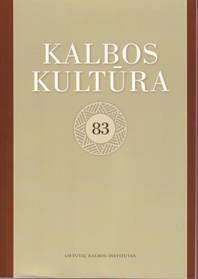Iš kur kilęs ki̇̀biras (kibi̇̀ras)
On the origin of ki̇̀biras (kibi̇̀ras)
Author(s): Vincentas DrotvinasSubject(s): Baltic Languages
Published by: Lietuvių Kalbos Institutas
Summary/Abstract: The article discusses the origin of two Lithuanian homonyms, namely, 1. ki̇̀biras, kibi̇̀ras ‘a small dry twig, a dry branch’, and 2. ki̇̀biras ‘a container to carry water and draw it from a well’ (Lietuvių kalbos žodynas, 1959, vol. V). The Dictionary of Contemporary Lithuanian (Dabartinės lietuvių kalbos žodynas, 2006) gives two stress variants for the second homonym: ki̇̀biras, kibi̇̀ras. The dictionaries of Lithuanian provide convincing evidence testifying to the Lithuanian origin of the word. This word originates in the Western Highlanders (Aukštaitian) subdialect, it has also been traced in some dictionaries that were published in the 17th c. in thePrussian Lithuania, or Lithuania Minor, is found in dictionaries and folklore collections. Moreover, the word belongs to the general lexicon of current Lithuanian. Etymologists K. Būga (1958, 1959), E. Fraenkel (1962), A. Brückner (1989), M. Vasmer (1986), and A. Bańkowski (2000) suggest different interpretations of its origin: OSlav. cьbьrъ (< OHG zwibar) and Lith. kib-ti „an.?“, kyb-oti „an.?“
Journal: Bendrinė kalba (iki 2014 metų – Kalbos kultūra)
- Issue Year: 2010
- Issue No: 83
- Page Range: 169-172
- Page Count: 4
- Language: Lithuanian

